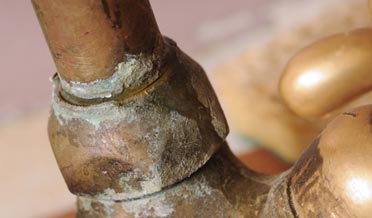Plumbing Repairs Caused by Hard Water
Most homes in Houston receive their water supply from groundwater sources, some of the purest water available. Water moves through underground streams that filter most harmful impurities out of the water. However, water will also pick up minerals from the surrounding rock base.
Most of the mineral content settles out during the water purification process, but traces of harmless chemicals remain in the water supply, mostly calcium and magnesium, essential minerals for our dietary needs. Water with high mineral content is commonly called hard water.
While the traces of minerals might be harmless and helpful, they do cause problems with our water supply network. This is especially true when water is distributed through devices with very small openings—faucets and showerheads, for example. As the water evaporates near these openings, the minerals are left behind.
Eventually, the deposits, called scales, can clog some of the holes and reduce water pressure through the faucet. Other appliances bothered by mineral scaling include washing machines, dishwashers, and icemakers. Removing mineral deposits from inside these devices can be difficult.
Another problem develops wherever water is stored—in a hot water tank, for example. Sediment tanks have removed most of the mineral content at the water treatment plant, but the mineral that remains in the water supply will deposit on the heating element or settle to the bottom of the tank. The efficiency of the water heater will diminish whenever enough mineral settles and the sediment covers the heating element inside the tank.
Hard Water Solutions
Solutions to the problem of hard water include removing the deposits and removing the minerals.
Maintenance and Plumbing Repairs
- A little bit of chemistry can make removing scaling from faucets and showerheads easy. Calcium carbonate is a salt or alkaline, and salts react with acids. A solution of vinegar and water will remove scaling from small openings. It is particularly useful to remove mineral deposits inside appliances that dispense drinking water, whether hot or cold. Be careful with commercial chemical scale removers, and do not add them to potable water.
- Draining the hot water tank is recommended to remove mineral sediment. Choose a time when hot water is not required. Find the drain valve at the base of the tank. It should connect with a regular garden hose. Before draining the tank, shut off the electric or gas supply to prevent overheating an empty tank. Also, shut off the water supply to prevent stirring the sediment at the bottom of the tank. Connect the hose and run it outdoors. Remember, the water will be hot enough to damage vegetation. Expect significant sediment to be carried in the water—that is the goal. Close the drain valve and open the supply valve to fill the tank. Let the water settle for a couple of hours after the tank has filled before turning on the power source.
Treatment
- Water softeners replace the calcium and magnesium in hard water with sodium. The chlorine in salt—sodium chloride—readily transfers to the calcium ion. The resulting compound is heavy and distills out of the water supply. The sodium creates a better bond with water; although it will eventually be deposited, it remains bonded to water longer, and less sodium is deposited.
- Water conditioners also use salt to react with calcium and magnesium but allow all the mineral compounds to travel through the supply. Conditioned water results in fewer mineral deposits in the supply network.
- Many family members must restrict sodium intake; adding sodium to regular drinking water or water used in cooking is not an option. A reverse osmosis system does not use sodium to treat water; an extremely fine filter removes mineral salts and provides high-quality drinking water. This filter system can handle drinking water, and a softener or conditioner can handle the rest of the water supply.
We Can Help with Plumbing Repairs Caused by Hard Water
Let Doctor Cool assist with plumbing repairs caused by hard water. Call Doctor Cool & Professor Heat today at 281-338-8751 or email Doctor Cool and let our professional Residential Plumber Contractors assist with all of your plumbing repair needs.
